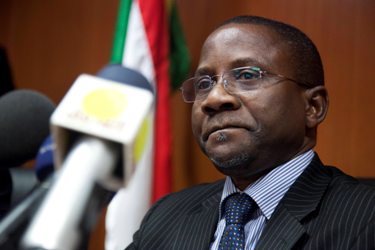UN official assesses human rights conditions in South Kordofan
February 14, 2014 (KHARTOUM) – The United Nations Human Rights Council (UNHRC) independent expert and special rapporteur on the human rights situation in Sudan, Mashood Badrein, has held series of meetings in South Kordofan to assess the situation in the state.

The UN official also met with local leaders, tribal chiefs, legislative council, international aid groups, and the UN agencies operating in South Kordofan state as well as released women prisoners who the security authorities claim were detained for collaborating with rebel groups.
He said in a press release that the visit enabled him to obtain useful information relating to human rights conditions in the state, pointing he will present them in a press conference next Sunday.
Al-Faki for his part stressed the visit sends positive signals and offers answers to questions relating to human rights situation in the state, pointing they provided Badrein with information on human rights violations committed by rebel groups besides detaining several civilians.
He said local legislation and laws in South Kordofan secure freedom of belief, worship, expression, and cultural practice for every citizen without restrictions, pointing to women and children protection laws.
Badrein arrived in Khartoum in a 10-day official visit to examine government efforts to promote and protect human rights and assesses the technical support provided by the international community.
In a report submitted to the UNHRC last September, he acknowledged that while the overall human rights situation in Sudan remains unstable and the implementation of policies on the ground remains slow, he said the Sudanese government had made progress in institutional and legislative developments aimed at improving the human rights situation.
Baderin also said there was now improved awareness about human rights issues both in the government sector and among the general population.
However, despite positive steps, he said Sudan continued to face enormous human rights challenges as a result of recurrent armed conflicts between government troops and rebel groups, as well as inter-tribal clashes and the operations of government security agencies, notably the National Intelligence and Security Service (NISS), which he says has impeded the enjoyment of basic civil and political rights.
He condemned suppression of demonstrations which erupted in Sudan last September following the government decision to lift fuel subsidies which resulted in a number of deaths and injuries.
Last October, the UNHRC agreed to renew the mandate of the independent expert on the situation of human rights in Sudan for a further 12 months.
The resolution was passed at the final meeting of the council’s 24th regular session in Geneva, Switzerland.
(ST)
